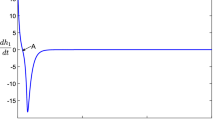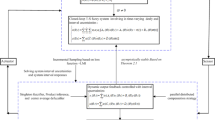Abstract
Stability and \(L_2\)-gain control for positive Takagi–Sugeno (T–S) fuzzy systems are further studied in this brief paper. First, considering that the system states are positive, some sufficient conditions of exponential asymptotic stability are obtained by applying a copositive Lyapunov function with membership-function-dependent (MFD) Lyapunov matrices. Based on a preset switching rule, the conditions are expressed as linear matrix inequalities by eliminating the nonconvex factors due to the time derivative of MFD Lyapunov matrices. Then, stability is extended to stabilization by designing a switching controller with time-varying controller gains such that the \(L_{2}\)-gain performance requirements are satisfied. In addition, a quadratic switching strategy is established to further reduce conservativeness. Finally, the applicability and validity of the theoretical results are validated by two examples.






Similar content being viewed by others
Data availability
The simulation data of the current study are available from the corresponding author on reasonable request.
References
Ahmadi, E., Zarei, J., Razavi-Far, R., Saif, M.: A dual approach for positive T–S fuzzy controller design and its application to cancer treatment under immunotherapy and chemotherapy. Biomed. Signal Process. Control 58, 101822 (2020)
Zhang, Q., Liu, C., Zhang, X.: Complexity Analysis and Control of singular Biological Systems. Springer, London (2012)
Benzaouia, A., Mesquine, F., Benhayoun, M., Schulte, H., Georg, S.: Stabilization of positive constrained T–S fuzzy systems: application to a Buck converter. J. Frankl. Inst. 351(8), 4111–4123 (2014)
Zhao, X., Liu, X., Yin, S., Li, H.: Improved results on stability of continuous-time switched positive linear systems. Automatica 50(2), 614–621 (2014)
Takagi, T., Sugeno, M.: Fuzzy identification of systems and its applications to modeling and control. IEEE Trans. Syst. Man. Cybern. SMC–15(1), 116–132 (1985)
Ahmadi, E., Zarei, J., Razavi-Far, R.: Robust \(\ell _{1}\)-controller design for discrete-time positive T–S fuzzy systems using dual approach. IEEE Trans. Syst. Man Cybern. Syst. 52(2), 706–715 (2022)
Zhu, B., Suo, M., Chen, L., Li, S.: Stability and \(L_{1}\)-gain analysis for positive Takagi–Sugeno fuzzy systems with impulse. IEEE Trans. Fuzzy Syst. 26(6), 3893–3901 (2018)
Zheng, X., Wang, X., Yin, Y., Hu, L.: Stability analysis and constrained fuzzy tracking control of positive nonlinear systems. Nonlinear Dyn. 83(4), 2509–2522 (2015)
Pan, J.-T., Guerra, T.M., Fei, S.-M., Jaadari, A.: Nonquadratic stabilization of continuous T–S fuzzy models: LMI solution for a local approach. IEEE Trans. Fuzzy Syst. 20(3), 594–602 (2012)
Zhang, H., Xie, X.: Relaxed stability conditions for continuous-time T–S fuzzy-control systems via augmented multi-indexed matrix approach. IEEE Trans. Fuzzy Syst. 19(3), 478–492 (2011)
Rhee, B.-J., Won, S.: A new fuzzy Lyapunov function approach for a Takagi–Sugeno fuzzy control system design. Fuzzy Sets Syst. 157(9), 1211–1228 (2006)
Chen, X., Lam, J., Lam, H.-K.: Positive filtering for positive Takagi–Sugeno fuzzy systems under \(\ell _{1}\) performance. Inf. Sci. 299, 32–41 (2015)
Wang, L., Lam, H.-K.: A new approach to stability and stabilization analysis for continuous-time Takagi–Sugeno fuzzy systems with time delay. IEEE Trans. Fuzzy Syst. 26(4), 2460–2465 (2018)
Palanimuthu, K., Kim, H.S., Joo, Y.H.: T–S fuzzy sliding mode control for double-fed induction generator-based wind energy system with a membership function-dependent \(H_{\infty }\)-approach. Inf. Sci. 596, 73–92 (2022)
Du, S., Qiao, J., Zhao, X., Wang, R.: Stability and \(L_{1}\)-gain analysis for switched positive T–S fuzzy systems under asynchronous switching. J. Frankl. Inst. 355(13), 5912–5927 (2018)
Li, S., Xiang, Z.: Exponential stability analysis and \(L_{2}\)-gain control synthesis for positive switched T–S fuzzy systems. Nonlinear Anal. Hybrid Syst. 27, 77–91 (2018)
Funding
This work was supported in part by the National Natural Science Foundation of China under Grant 62173123, in part by the Natural Science Foundation of Hebei Province under Grant F2021202045.
Author information
Authors and Affiliations
Contributions
All authors contributed to the study conception and design. The main idea and method were proposed by [LW]. The first draft of the manuscript was written by [BZ]. [XX] and [H-KL] commented on previous versions of the manuscript. All authors read and approved the final manuscript
Corresponding author
Ethics declarations
Conflict of interest
The authors have no relevant financial interests to disclose.
Additional information
Publisher's Note
Springer Nature remains neutral with regard to jurisdictional claims in published maps and institutional affiliations.
Rights and permissions
Springer Nature or its licensor (e.g. a society or other partner) holds exclusive rights to this article under a publishing agreement with the author(s) or other rightsholder(s); author self-archiving of the accepted manuscript version of this article is solely governed by the terms of such publishing agreement and applicable law.
About this article
Cite this article
Zheng, B., Wang, L., Xie, X. et al. Stability analysis and \(L_{2}\)-gain control for positive fuzzy systems by applying a membership-function-dependent Lyapunov function. Nonlinear Dyn 111, 22255–22265 (2023). https://doi.org/10.1007/s11071-023-09002-8
Received:
Accepted:
Published:
Issue Date:
DOI: https://doi.org/10.1007/s11071-023-09002-8




